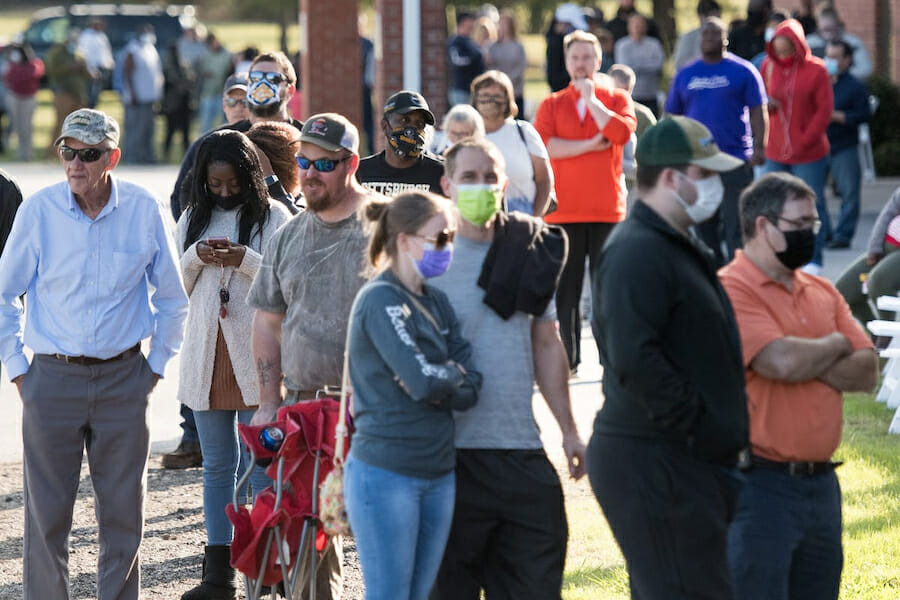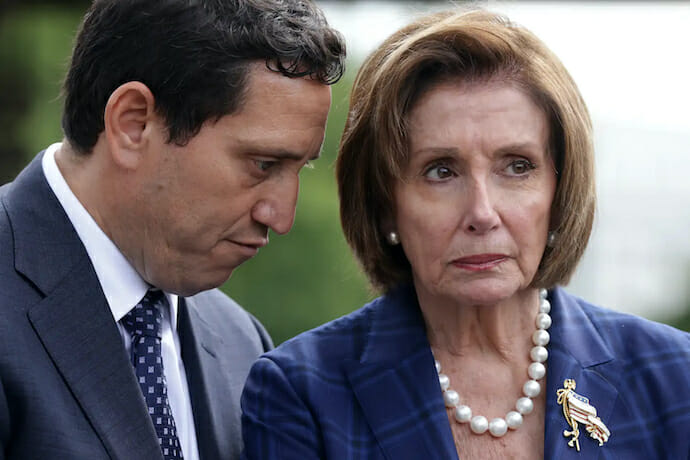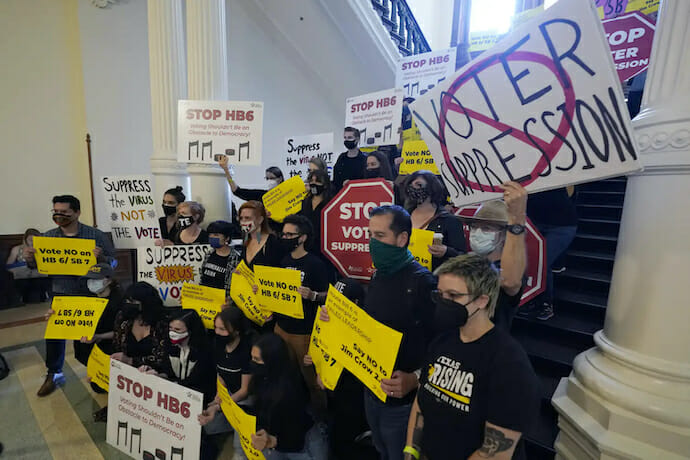
Politics
Despite Outrage, New State Voting Laws Don’t Spell Democracy’s End – but There are Some Threats
The sky is falling – that’s what you may believe about a rash of new election laws being introduced, largely by the GOP, in statehouses across the country. Alternatively, you may think these laws are absolutely crucial to ensuring election integrity. The Conversation’s Senior Politics Editor Naomi Schalit interviewed election law scholar Derek Muller about how he sees these new laws. Muller provides a surprisingly sanguine interpretation of what’s going on. The transcript has been edited for length and clarity.
One group has said that “Americans’ access to the vote is in unprecedented peril.” What do you think?
I would not say that. These election bills marginally increase the difficulty for some voters by reducing some of the options, whether it’s voting by mail or early voting. But many of these bills also expand voting opportunities, and many of them are tinkering at the margins of expansions during the COVID pandemic in 2020.
In some circumstances, voters are no worse off than they were in 2018, and in some circumstances, they are better off. So, while there’s a lot of heated rhetoric, I would say the changes to election laws so far have been fairly modest.
So, if you compare the new laws to what the status of the laws was before those pandemic era expansions, it’s not that dramatic?
In many states, voting in 2022 and 2024 will not look very different than it did in 2016. In some cases, there are bigger changes, but many times they’re marginal things not obvious to the vast majority of voters.
We’re seeing a coordinated attack on voting rights in this country. It’s Jim Crow in the 21st century, and it must end.
Congress must enact legislation to make it easier for all eligible Americans to access the ballot box and prevent attacks on the sacred right to vote.
— Joe Biden (@JoeBiden) June 15, 2021
Critics say these laws make it harder to vote. Are you seeing any evidence of that?
It depends on how we define “harder.” Let’s pick a law in Iowa. You could request absentee ballots up until 10 or 11 days before the election, and now it’s up until 15 days before the election. Is that harder? You can still show up and vote on Election Day, you can still vote early. It’s just that the window of opportunity to request an absentee ballot has narrowed.
On the flip side, does it really discourage many voters or prevent them from being able to vote? I think those are the open empirical questions that will have to be asked in the future.
Anything that limits or constrains voting days where they used to exist before does make it marginally harder. But the question is how significant the marginal cost is.
Do these laws have measurable effects on turnout?
I’m not a political scientist, so I’m careful about these kinds of questions. But a lot of the empirical literature is quite mixed. There’s some evidence that some kinds of voter identification laws reduce turnout by a point or two. There are others that suggest they have no discernible impact on turnout.
Attorney General Merrick Garland has said the Department of Justice will scrutinize the wave of new laws and take action on any violations of federal law. What does it mean to have the attorney general say this?
The attorney general can investigate and scrutinize those laws. That’s principally the attorney general’s power under the Voting Rights Act, to think about initiating claims alleging that the political process is not equally open to participation on the basis of race.
But scrutinizing laws is very different from bringing a lawsuit, and bringing a lawsuit is very different from a court agreeing that the law does have that effect. Complicating matters is that the Supreme Court is considering a case about how the Voting Rights Act should be construed – Brnovich v. Democratic National Committee. The court might make it actually harder for the Department of Justice to bring those claims in the future. But undoubtedly the department investigating what states are doing will put legislators on their toes to think about how to tailor laws in a way that will not subject them to the department’s wrath.
Do we know whether these laws affect election outcomes in terms of partisan politics? The criticism is that “the Republicans are putting measures into law that will help them win elections.”
One question is whether it even affects turnout in the first place. Then the next question is, even if it does affect turnout, does it benefit one political party over another?

So it’s political parties fighting over this, whether or not it actually has the effects that people think.
Do moves like this actually backfire by upsetting people who feel targeted?
Undoubtedly, actions in North Carolina and Georgia over the last several years significantly mobilized Democratic voters and voters of color to turn out as a kind of backlash. There were significant Democratic victories in North Carolina and Georgia shortly after controversies over voting laws came to the surface. How you measure that backlash is another political science question, but it remains a viable tool for those who oppose the laws to simply mobilize, get out the vote and elect their preferred candidates.
How do these laws comport with the general democratic standard of everyone who is eligible can cast a vote?
We have dramatically expanded opportunities to vote in the last several decades. Early voting was basically nonexistent 20 years ago, no-excuse absentee voting is now the default in many states, several states mail every eligible voter a ballot.
There are benefits to having so many opportunities, but those come with costs: The systems they create are sprawling, they are unwieldy at times, providing many more opportunities for things to go wrong or for people to be skeptical of the outcome. And stretching an election out over six or eight weeks means we’re all voting with different kinds of information at the beginning of an election season versus at the end.
In some of these laws, state legislatures’ involvement in elections has been increased – although I think the public is not necessarily aware of the involvement of partisans in election administration already. Is that a concern?
Most of our elections are run by partisan officials. Secretaries of state have a Republican or Democratic affiliation, and their role in certifying election results has typically been a pro forma task.

At the same time, especially before the election, there were changes being made by county or state officials, things executive branch officials were doing, that didn’t necessarily comport with what the legislature had expressly provided in non-emergency situations, that caused a lot of friction between the legislature and those officials.
So, some of the proposed or enacted laws try to rein in local officials’ discretion. In Georgia, the legislature will choose one of the members of the Board of Elections to certify elections, instead of allowing the secretary of state to serve on that board. These tweaks happening in states reduce the amount of discretion that election officials have, or allow the legislature to have some say – not a total say – in that election process.
Is the legislature having “some say” a threat to election integrity?
It seems like it would increase the threat. For the most part, we’ve seen election administrators be professionals who view this as their full-time job, who see all the inner workings, from day to day, in the two years before an election is held and know what’s going on. As opposed to the legislature, which might view something – after the fact, or when its attention is stretched in other directions – as dubious and wanting to revisit what happened. So, there is that concern.
Now, if the legislature wants to pick its own representative to serve on a board with multiple other people and it’s not going to overwhelm the board, maybe that’s okay. But undoubtedly it does increase the risk of the legislature choosing to meddle as a political branch, in a different way from the election officials who – despite their partisan affiliation – often rise above that.
What about the proposals to further empower poll watchers?
I’ve worked many elections as a precinct election official in multiple states and many counties. And I had extensive training before doing that – there’s a bipartisan group that supervises the process and we all take our job very seriously. We want to make sure that eligible voters participate, that we can ensure that only eligible voters cast a ballot, that we count everything carefully at the end of the night.
Poll watchers might not have that training, might be disruptive, might not know what is going on, or have a total context of what’s happening. There’s an increased risk from poll watchers, if they show up already skeptical that the precinct election officials are doing their job properly, then that starts to undermine some of the confidence in the electoral process.
You want the campaigns to be confident that the election is being run smoothly and properly, and there should be opportunities to observe and ensure that there are no irregularities happening. But given the rarity of irregularities actually happening in the United States, increasing the power or number of poll watchers might lead to some unintended consequences, particularly friction at the polls in future elections.
Do any of these laws concern you as an electoral scholar?
I’m concerned about changes that appear more to be appeasing the 2020 losers rather than picking the best laws for administering elections going forward. It’s prompted state legislators to be reactive. I’m not a fan of reactive legislation in that sense.
It concerns me that there’s a candidate who loses an election, and many of that candidate’s supporters question the legitimacy of the election itself. I don’t know that these laws, or really any laws, are ever going to restore the public’s confidence in elections. If it’s just the loser doesn’t want to believe in the legitimacy of the outcome, obviously, when the candidate himself is undermining those results, that is a much more serious concern.
This article was originally published on The Conversation. Read the original article.
